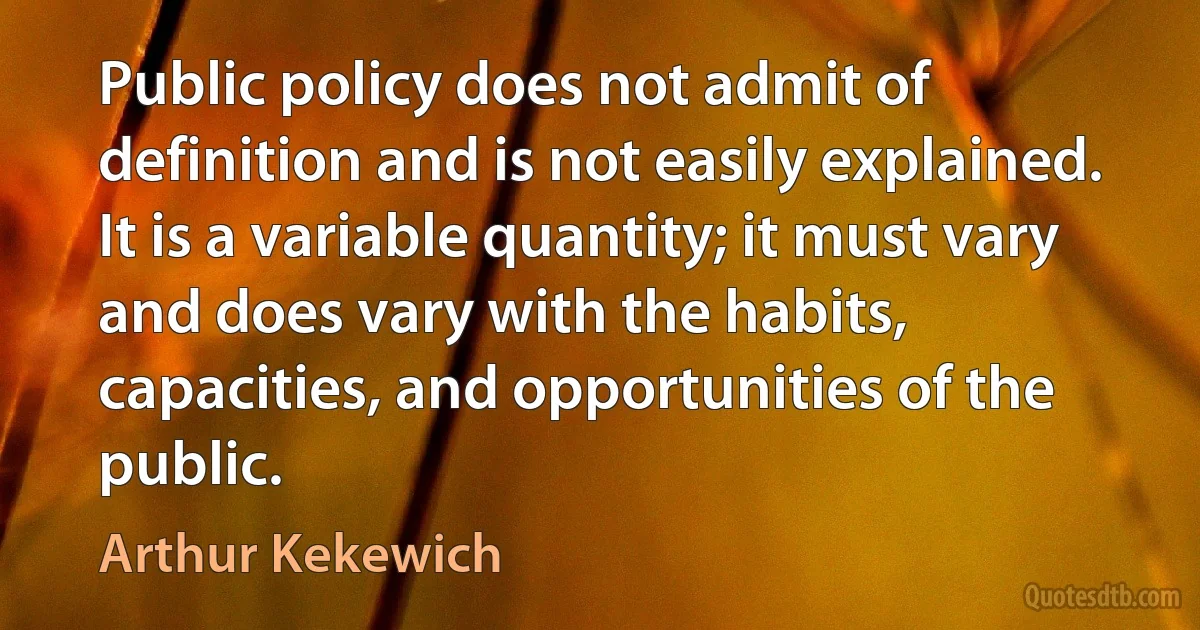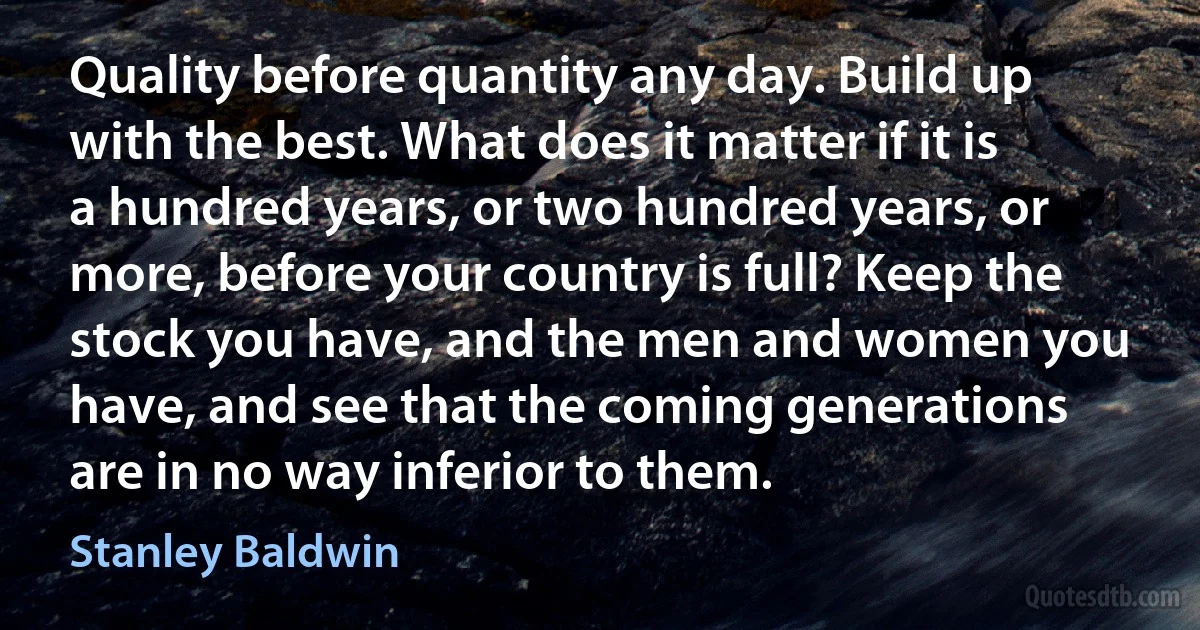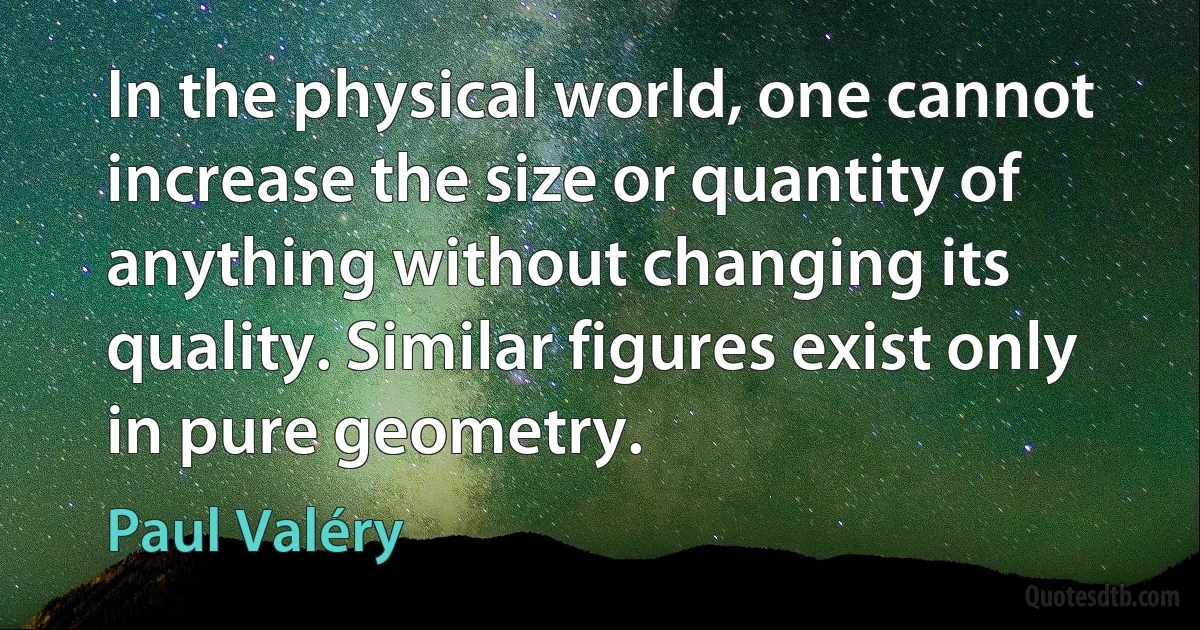Quantity Quotes - page 13
Oh, if in this man, whose eyes can flash Heaven's lightning, and make all Calibans into a cramp, there dwelt not, as the essence of his very being, a God's justice, human Nobleness, Veracity and Mercy,-I should tremble for the world. But his strength, let us rejoice to understand, is even this: The quantity of Justice, of Valour and Pity that is in him. To hypocrites and tailored quacks in high places, his eyes are lightning; but they melt in dewy pity softer than a mother's to the downpressed, maltreated; in his heart, in his great thought, is a sanctuary for all the wretched.

Thomas Carlyle
My friend, brag not yet of our American cousins! Their quantity of cotton, dollars, industry and resources, I believe to be almost unspeakable; but I can by no means worship the like of these. What great human soul, what great thought, what great noble thing that one could worship, or loyally admire, has yet been produced there? None: the American cousins have yet done none of these things.

Thomas Carlyle
The Church, poor old benighted creature, had at least taken care of that: the noble aspiring soul, not doomed to choke ignobly in its penuries, could at least run into the neighboring Convent, and there take refuge. Education awaited it there; strict training not only to whatever useful knowledge could be had from writing and reading, but to obedience, to pious reverence, self-restraint, annihilation of self,-really to human nobleness in many most essential respects. No questions asked about your birth, genealogy, quantity of money-capital or the like; the one question was, "Is there some human nobleness in you, or is there not?"

Thomas Carlyle
Compassion is an unstable emotion. It needs to be translated into action, or it withers. The question is what to do with the feelings that have been aroused, the knowledge that has been communicated. People don't become inured to what they are shown - if that's the right way to describe what happens - because of the quantity of images dumped on them. It is passivity that dulls feeling.

Susan Sontag
The notion of rights is linked with the notion of sharing out, of exchange, of measured quantity. It has a commercial flavor, essentially evocative of legal claims and arguments. Rights are always asserted in a tone of contention; and when this tone is adopted, it must rely upon force in the background, or else it will be laughed at.

Simone Weil
God is all love, and the more we are like Him the more we shall love; the trouble is not in the quantity but the quality of our love. If it were wholly pure, wholly unselfish, it could not be too deep or intense; for all true loving lifts us to a higher plane, bringing us nearer to God and the eternal goodness.

Arthur Kenney
Literature soon becomes a power, not what it once was, a passion; but literary success, like all others, is only to be obtained, and retained, by labour - and labour and inclination do not always go together. Take all our most eminent writers, and the quantity of work, hard work, they have got through, will be found enormous and perpetual. Literature, as a profession, allows little leisure, and less indulgence.

Letitia Elizabeth Landon
Through and through the world is infested with quantity To talk sense is to talk quantities. It is no use saying the nation is large.... How large It is no use saying the radium is scarce.... How scarce You cannot evade quantity. You may fly to poetry and music, and quantity and number will face you in your rhythms and your octaves.

Alfred North Whitehead
A Paradox, the doughnut hole. Empty space, once, but now they've learned to market even that. A minus quantity; nothing, rendered edible. I wondered if they might be used-metaphorically, of course-to demonstrate the existence of God. Does naming a sphere of nothingness transmute it into being?

Margaret Atwood
It's very hard for students not to be in debt unless they've got big scholarships or rich parents. And it's called investing in your future, but like any investment it's risky because your future is an unknown quantity. However, if you don't invest in your future, you may be flipping hamburgers for the rest of your life. So it's a real dilemma.

Margaret Atwood
The saying that a little knowledge is a dangerous thing is, to my mind, a very dangerous adage. If knowledge is real and genuine, I do not believe that it is other than a very valuable posession, however infinitesimal its quantity may be. Indeed, if a little knowledge is dangerous, where is a man who has so much as to be out of danger?

Thomas Henry Huxley
When... we have a series of values of a quantity which continually diminish, and in such a way, that name any quantity we may, however small, all the values, after a certain value, are severally less than that quantity, then the symbol by which the values are denoted is said to diminish without limit. And if the series of values increase in succession, so that name any quantity we may, however great, all after a certain point will be greater, then the series is said to increase without limit.

Augustus De Morgan
Take a unit, halve it, halve the result, and so on continually. This gives-1 1⁄2 1⁄4 1⁄8 1⁄16 1⁄32 1⁄64 1⁄128 &c.;Add these together, beginning from the first, namely, add the first two, the first three, the first four, &c;... We see then a continual approach to 2, which is not reached, nor ever will be, for the deficit from 2 is always equal to the last term added.
...We say that-1, 1 + 1⁄2, 1 + 1⁄2 + 1⁄4, 1 + 1⁄2 + 1⁄4 + 1⁄8, &c.; &c.;is a series of quantities which continually approximate to the limit 2. Now the truth is, these several quantities are fixed, and do not approximate to 2. ...it is we ourselves who approximate to 2, by passing from one to another. Similarly when we say, "let x be a quantity which continually approximates to the limit 2," we mean, let us assign different values to x, each nearer to 2 than the preceding, and following such a law that we shall, by continuing our steps sufficiently far, actually find a value for x which shall be as near to 2 as we please.

Augustus De Morgan
The following is exactly what we mean by a LIMIT. ...let the several values of x... bea1 a2 a3 a4.... &c.;then if by passing from a1 to a2, from a2 to a3, &c.;, we continually approach to a certain quantity l [lower case L, for "limit"], so that each of the set differs from l by less than its predecessors; and if, in addition to this, the approach to l is of such a kind, that name any quantity we may, however small, namely z, we shall at last come to a series beginning, say with an, and continuing ad infinitum,an an+1 an+2.... &c.;all the terms of which severally differ from l by less than z: then l is called the limit of x with respect to the supposition in question.

Augustus De Morgan



